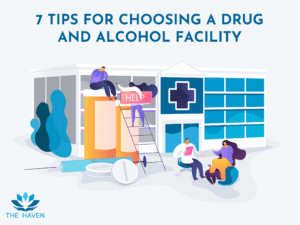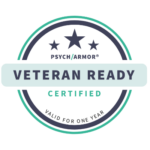 Has excessive drug or alcohol use turned your life upside down? If you answered yes, it might be time to find a detox facility to help end the cycle of chemical dependency and addiction. The main goal of detox is to stabilize physical and mental health while providing the best opportunity for life-long sobriety.
Has excessive drug or alcohol use turned your life upside down? If you answered yes, it might be time to find a detox facility to help end the cycle of chemical dependency and addiction. The main goal of detox is to stabilize physical and mental health while providing the best opportunity for life-long sobriety.
There are many factors to explore when looking for a drug and alcohol detox facility for yourself, a friend, or a family member. With a multitude of options to choose from, it is a challenging task to pick the best one.
You might want to write down your top questions to ask when you are on the phone with the admissions team. This can help make the decision to enter detox easy, painless and complication-free.
How Do I Choose the Right Rehab?
Here are the top 7 questions to ask each facility and help you choose a detox program to meet your recovery goals.
- What treatment methods do they offer?
- Are they a licensed and accredited facility?
- What insurance plans do they accept?
- Do they offer medically assisted detox?
- What are their holistic therapy options?
- What is the detox admissions process?
- Do they provide aftercare support?
Use these helpful tips to help you narrow down your search for the perfect detox facility.
1. What Treatment Methods Do They Offer?
The first task is to find a residential facility that offers detox programs focused on treating your particular substance use disorder such as alcohol, opioids, crack, meth, or benzos.
Top drug detox, opioid detox and alcohol detox facilities provide basic therapies to help their patients get well. Choose a residential drug and alcohol detoxification center that offers a customized plan incorporating treatment methods such as:
- Intervention
- Individual therapy
- Group therapy
- Medical care
- Spiritual counseling
- Psychiatry services
- Relapse prevention programming
- Dual-diagnosis treatment
- Life-skills building
- Recreational activities
Group counseling, shared experiences and other treatment methods help you form long-term relationships and lasting bonds with both your peers and your therapists. This gives you a chance to become centered and clear-minded with a focus on sobriety once the detoxification process is complete.
2. Are They a Licensed and Accredited Detox Facility?
Once you’ve narrowed down your choice to one or two detox centers, it’s important to do your due diligence to find a licensed and accredited facility. Common certifications held by rehab centers include the Joint Commission, CARF Accreditation and LegitScript.
Also, just because you’ve seen countless online ads or TV commercials doesn’t mean it’s a reputable center. You need to spend time researching their online reputation by visiting their website and reviewing their social media profiles.
You’ll also want to do a Google search of their name to see what pops up on 3rd party review sites like Yelp, Google Business, The Fix and PsychologyToday.
3. What Insurance Plans Do They Accept?
This is probably one of the most important questions to ask. What types of insurance do they take and what are their private pay and finance options if you don’t have coverage?
Private detox can be quite expensive, so unless you’re independently wealthy, you probably want to use insurance to pay for detox services. While many insurance plans cover services for mental health and substance abuse disorders, it’s important to know if the facility you want to go to accepts your insurance.
Most facilities work with different insurance carriers to help their patients cover the cost of treatment. You can call the facility to speak with an admissions rep who will contact your provider to verify your benefits and let you know what services are covered by your plan.
4. Do They Offer Medically Assisted Detox?
One of the major roadblocks to entering treatment is the fear of the unknown. Detox can take 3, 5, 7 days or more depending on the substance used, how much was used and the length of use.
The detox process counteracts the effects of drug or alcohol addiction by eliminating the body of chemical substances, reversing physical dependency and returning the brain to normal function. Unfortunately, this process may result in unpleasant and potentially dangerous withdrawal symptoms.
Detoxing “cold turkey” on your own is not recommended because of the high risk of medical complications. It’s important to find out if the facility provides round the clock, 24/7 supervision and care to continually monitor and manage any of these symptoms. Medically assisted detox ensures there are trained and licensed medical staff and clinicians on-site to check vital signs and help stabilize you during this difficult process.
5. What Are Their Holistic Therapy Options?
Holistic therapy focuses on both the mental and physical addiction symptoms along with identifying any nutritional or emotional imbalances for optimal health and wellness. Find out if the facility provides alternative rehab options such as EMDR, biofeedback, or adventure therapy.
Common holistic therapy methods include:
- Yoga
- Tai Chi
- Guided meditation
- Art therapy
- Recreational activities
- Acupuncture
- Chiropractic care
- Massage therapy
- Equine-assisted therapy
- Nutritional education
These holistic therapies complement traditional recovery methods to provide a comprehensive detoxification plan for the person seeking treatment.
6. What is the Detox Admissions Process?
Ask the detox center about their specific admissions process to help you prepare for detox. Most facilities require a pre-admissions phone screening. During this initial assessment, the admissions representative will determine if the facility is a good fit for your needs, prior to scheduling a time and date for your admission into treatment.
Ask about their specific admissions process including what to expect when you enter detox, what items you should bring with you and what items you need to leave at home. The admissions rep will also answer questions such as the location of the nearest airport and if they provide transportation to pick you up once your flight gets in.
7. Do They Provide Aftercare Support?
Unfortunately, recovery doesn’t end with discharge after completing a drug or alcohol detoxification program. After about two weeks of stabilization, you are better prepared to enroll in a lower level of care. Aftercare planning helps guide you through the next steps of recovery.
A continuum of care plan should include options for making a smooth and stress-free transition to PHP, IOP, OP or dual-diagnosis treatment. This plan can also include resources for family support groups, alumni support groups, transition to sober living, help finding permanent housing, vocational counseling and more.
Making the Right Choice
Detoxing in a safe and secure medical setting will allow you to properly overcome substance use or alcohol use disorder. At The Haven Detox, we help you every step of the way to make sure you have a comfortable and successful outcome.
The Haven is a state of the art facility in West Palm Beach, Florida. Our top detoxification programs include:
- Alcohol
- Bath Salts
- Barbiturates
- Benzos
- Crack
- Cocaine
- Flakka
- Heroin
- Methadone
- Methamphetamine
- Opiates
- Suboxone
Get ready to begin your journey to recovery at the best drug and alcohol detox facility in Florida. Call The Haven Detox today: 561-328-8627.






